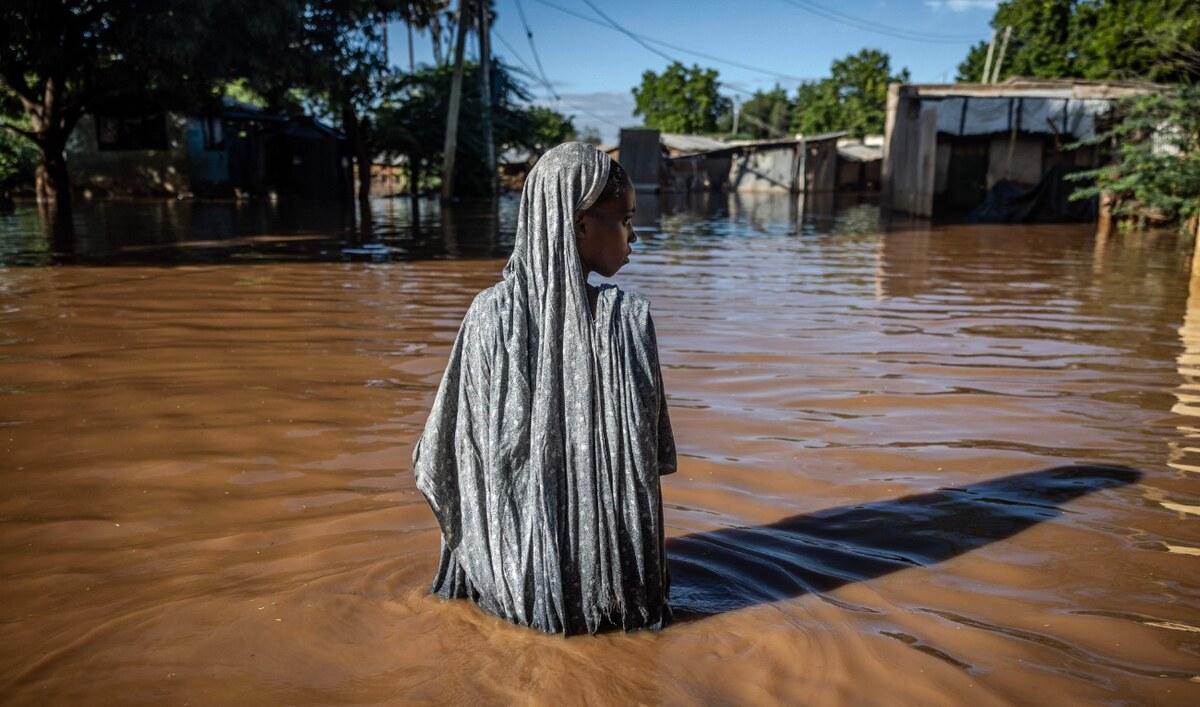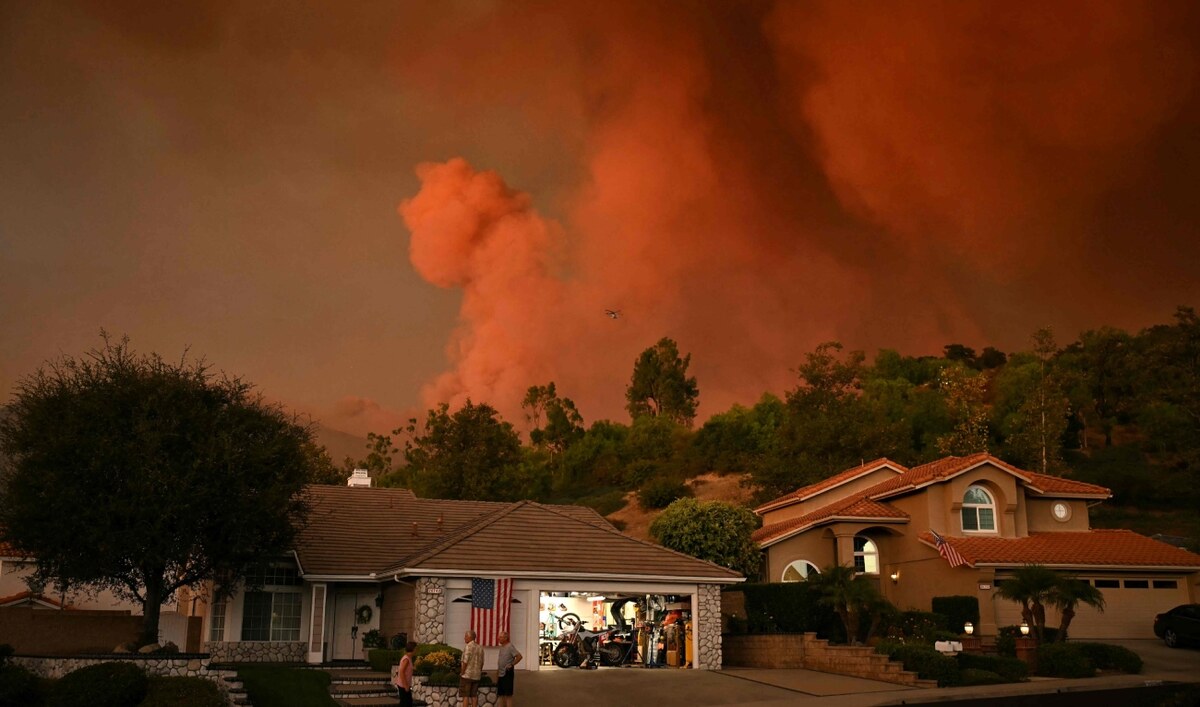MOSCOW: Russia on Thursday wrapped itself in patriotic pageantry for Victory Day, as President Vladimir Putin celebrated the defeat of Nazi Germany in World War II by hailing his forces fighting in Ukraine and blasting the West for fueling conflicts around the world.
Even though few veterans of what Russia calls the Great Patriotic War are still alive 79 years after Berlin fell to the Red Army, the victory remains the most important and widely revered symbol of RussiaŌĆÖs prowess and a key element of national identity.
Putin has turned Victory Day ŌĆö the countryŌĆÖs most important secular holiday ŌĆö into a pillar of his nearly quarter-century in power and a justification of his military action in Ukraine.
Two days after beginning his fifth term in office, he led the festivities across Russia that recall the nationŌĆÖs wartime sacrifice.
ŌĆ£Victory Day unites all generations,ŌĆØ Putin said in a speech in Red Square that came on the coldest May 9 in decades amid some snow flurries. ŌĆ£We are going forward relying on our centuries-old traditions and feel confident that together we will ensure a free and secure future of Russia.ŌĆØ
As battalions marched by and military hardware ŌĆö both old and new ŌĆö rumbled over the cobblestones, the sky cleared briefly to allow a flyby of warplanes, some of which trailed smoke in the white, red and blue of the Russian flag.
Putin hailed the troops fighting in Ukraine as ŌĆ£our heroesŌĆØ for their courage, resilience and self-denial, adding that ŌĆ£all of Russia is with you.ŌĆØ
He accused the West of ŌĆ£fueling regional conflicts, inter-ethnic and inter-religious strife and trying to contain sovereign and independent centers of global development.ŌĆØ
With tensions with Washington over Ukraine soaring to their highest level since the Cold War, Putin issued another stark reminder of MoscowŌĆÖs nuclear might.
ŌĆ£Russia will do everything to prevent global confrontation, but will not allow anyone to threaten us,ŌĆØ he said. ŌĆ£Our strategic forces are in combat readiness.ŌĆØ
Nuclear-capable Yars intercontinental ballistic missiles were pulled across Red Square, underscoring his message.
The Soviet Union lost about 27 million people in World War II, an estimate that many historians consider conservative, scarring virtually every family.
Nazi troops overran much of the western Soviet Union when they invaded in June 1941, before being driven back all the way to Berlin, where the USSRŌĆÖs hammer and sickle flag was raised above the ruined capital. The US, U.K, France and other allies mark the end of the war in Europe on May 8.
The immense suffering and sacrifice in cities like Stalingrad, Kursk and PutinŌĆÖs native Leningrad ŌĆö now St. Petersburg ŌĆö still serve as a powerful symbol of the countryŌĆÖs ability to prevail against seemingly overwhelming challenges.
Since coming to power on the last day of 1999, Putin has made May 9 an important part of his political agenda, featuring missiles, tanks and fighter jets. Medal-bedecked veterans joined him Thursday to review the parade, and many ŌĆö including the president ŌĆö wore the black-and-orange St. GeorgeŌĆÖs ribbon that is traditionally associated with Victory Day.
About 9,000 troops, including about 1,000 who fought in Ukraine, took part in ThursdayŌĆÖs parade.
Although the US and UK ambassadors did not attend, Putin was joined by other dignitaries and presidents of several former Soviet nations along with a few other Moscow allies, including the leaders of Cuba, Guinea-Bissau and Laos.
In his speech, he accused the West of ŌĆ£revanchism ŌĆ” hypocrisy and liesŌĆØ in seeking to play down the Soviet role in defeating Nazi Germany.
Putin described Victory Day as ŌĆ£very emotional and poignant.ŌĆØ
ŌĆ£Every family is honoring its heroes, looking at pictures with dear faces and remembering their relatives and how they fought,ŌĆØ he said.
Putin, 71, talks frequently about his family history, sharing memories of his father, who fought on the front during the Nazi siege of the city and was badly wounded.
As Putin tells it, his father, also named Vladimir, came home from a military hospital during the war to see workers trying to take away his wife, Maria, who had been declared dead of starvation. But the elder Putin did not believe she had died ŌĆö saying she had only lost consciousness, weak with hunger. Their first child, Viktor, died during the siege when he was 3, one of more than 1 million Leningrad residents who died in the 872-day blockade, most of them from starvation.
For several years, Putin carried a photo of his father in Victory Day marches ŌĆö as did others honoring relatives who were war veterans ŌĆö in what was called the ŌĆ£Immortal Regiment.ŌĆØ
Those demonstrations were suspended during the coronavirus pandemic and then again amid security concerns after the start of the fighting in Ukraine.
As part of his efforts to burnish the Soviet legacy and trample on any attempts to question it, Russia has introduced laws that criminalized the ŌĆ£rehabilitation of NazismŌĆØ that include punishing the ŌĆ£desecrationŌĆØ of memorials or challenging Kremlin versions of World War II history.
When he sent troops into Ukraine on Feb. 24, 2022, Putin evoked World War II in seeking to justify his actions that Kyiv and its Western allies denounced as an unprovoked war of aggression. Putin cited the ŌĆ£denazificationŌĆØ of Ukraine as a main goal of Moscow, falsely describing the government of Ukrainian President Volodymyr Zelensky, who is Jewish and lost relatives in the Holocaust, as neo-Nazis.
Putin tried to cast UkraineŌĆÖs veneration of some of its nationalist leaders who cooperated with the Nazis in World War II as a sign of KyivŌĆÖs purported Nazi sympathies. He regularly made unfounded references to Ukrainian nationalist figures such as Stepan Bandera, who was killed by a Soviet spy in Munich in 1959, as an underlying justification for the Russian military action in Ukraine.
Many observers see PutinŌĆÖs focus on World War II as part of his efforts to revive the USSRŌĆÖs clout and prestige and his reliance on Soviet practices.
ŌĆ£ItŌĆÖs the continuous self-identification with the USSR as the victor of Nazism and the lack of any other strong legitimacy that forced the Kremlin to declare ŌĆśdenazificationŌĆÖ as the goal of the war,ŌĆØ Nikolay Epplee said in a commentary for Carnegie Russia Eurasia Center.
The Russian leadership, he said, has ŌĆ£locked itself up in a worldview limited by the Soviet past.ŌĆØ
Russia celebrates victory in World War II as Putin accuses the West of fueling global conflicts
https://arab.news/jtazm
Russia celebrates victory in World War II as Putin accuses the West of fueling global conflicts



























